Getting older might not be an idea you relish, but the process isn’t exactly avoidable. Each day you’re alive, your cells and systems are suffering damage that slowly ages you. While time passes for all of us at the same pace, some people tend to show more signs of aging than others. Is your face making you look older than you are? Here are eight signs that you’re not aging well, along with steps you can take to slow down the process.
What Causes Aging?
Daily life is hard on your body, and over time it will start to show signs of aging. But what causes this process to begin in the first place?
Most researchers agree that aging is a result of the interactions between your lifestyle and your genetics. A 2009 study that assessed twins found that genetics alone were responsible for up to 60 percent of a participants susceptibility to developing fine lines and wrinkles, so your parents and siblings are a reliable indicator of how the aging process will affect you. This is because your genes direct cellular functions that dictate your physical appearance, like hair thickness, skin moisture level, and predisposition to age spots.
Your personal lifestyle choices are the other side of the aging equation. Whether or not you smoke, exercise regularly, eat healthily or wear sunscreen each day will make an impact on how old you look.
Twelve Top Signs That You Won’t Age Well
Still in the dark about whether you’re on your way to developing lasting laugh lines? Below are twelve signs that you’re not aging well and should consider changing your behaviour before the impacts are permanent.
1.You Have Light Skin
The amount of melanin in your skin affects how fast you start to show your age, and darker skin tones show wrinkles more slowly than pale tones. That’s because light skin has less natural sun protection, so it tends to show damage more quickly. This leads to an accelerated rate of sunspots and wrinkle formation. Research backs this up, as a study sponsored by Olay found that women of African and Asian descent showed signs of aging later in life than Caucasian women.
Though there’s little you can do to change your naturally pale skin, you can protect it from sun damage by putting on safe sunscreen before going outside each day.
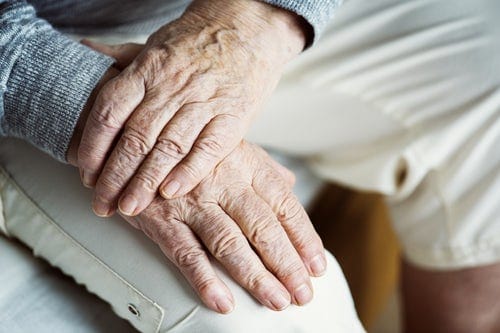
Another indicator that your skin might soon look older is dealing with chronic skin conditions like eczema or other dryness. Hydrated skin cells can rapidly repair themselves, but dry skin struggles to recover, leading to fine lines over time. The solution? Slather on that moisturizer to keep your cells healthy.
2. Your Natural Facial Structure Predisposes You to Aging
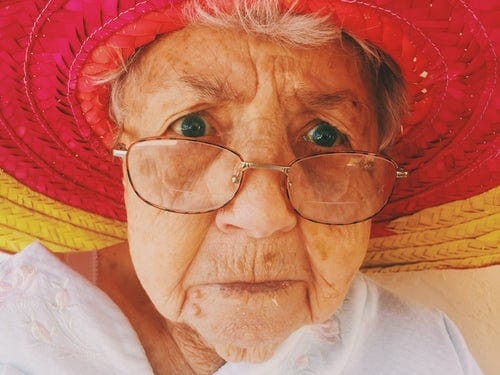
Though it seems unfair, your natural facial structure might predispose you to aging. For instance, high cheekbones can help you age more slowly, as they continue to support your skin as it loses elasticity. Likewise, a lack of natural facial symmetry is a sign you might have been exposed to environmental stressors in the womb that can potentially predispose you to wrinkles and other signs of aging. Adults with high facial symmetry, in contrast, often have more resistance to standard aging triggers.
Finally, another factor that affects your face is bone loss. Bone loss is a natural part of getting older, and it leaves you with an aged profile by contributing to sunken cheeks, thinning lips, and a bulging temple. Some lifestyle factors can speed up this process, including smoking or a poor diet.
3. You Don’t Eat a Healthy Diet
It shouldn’t be a surprise that your diet plays a crucial role in your overall health, but few people appreciate how interconnected your food and your youthful face can be. For instance, new research shows that eating a diet that’s filled with fresh fruits and vegetables can keep you looking your best while eating meals loaded with processed carbohydrates, simple sugars, and other unnatural foods can speed up the aging process by increasing inflammation within your system.
4. You’re Losing Hair
A receding hairline isn’t only a problem for males- people of both genders experience hair loss as they age. This hair loss isn’t restricted just to your scalp, though. If you start to notice you have less hair than usual on your arms, legs, and even toes, this is a sign that your body is beginning to age faster than expected. If the change is extreme, be sure to schedule an appointment with a functional medicine specialist, as your hair loss might be an indication that your blood vessels are dying off beneath the skin, putting you at risk of vascular disease.
5. You Have More Fat Around Your Midsection
Gaining weight is a normal part of aging these days, but that doesn’t mean it’s healthy for you. One indication that your weight gain is part of the aging process is whether the fat tends to collect at your belly. Experiencing bone and muscle loss as you age means that you lose inches off your height and thigh muscles start to shrink, which puts most weight gain right in your middle. Because abdominal fat is one of the most dangerous you can keep around, it’s critical that you work to keep yourself at a healthy weight, regardless of your age.
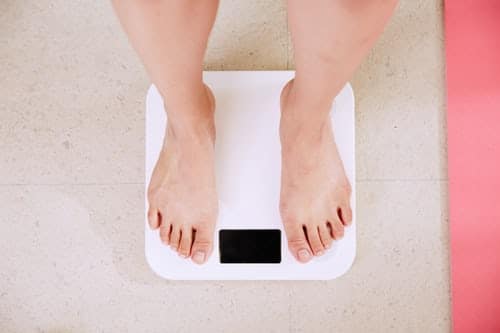
6. You’re Experiencing Problems with Insomnia
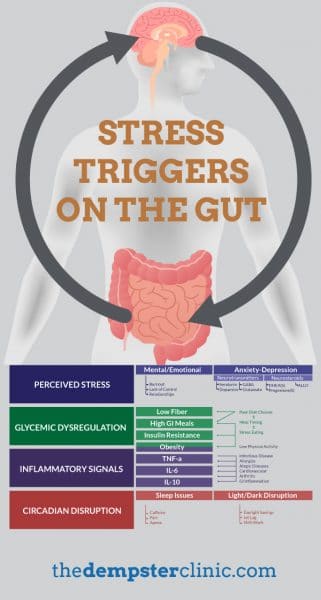
Struggling to get enough sleep? Your insomnia problems may be linked to the aging process. This is often due to high cortisol levels. Cortisol is a stress hormone that builds up in your system from stress, age or a lack of sleep. Permitting your levels to get too high will impact your health by contributing to weight gain, lower immune functioning, and a host of chronic diseases. Failing to get enough sleep at night will only increase these problems.
Waking up with a dry mouth is another sign that poor sleep quality is affecting the aging process. “Cotton mouth” is often linked with sleep apnea, a serious sleep disorder where you fail to take in enough oxygen at night. If your mouth is unbearable when you first wake up and you feel groggy throughout the day, sleep apnea might be the problem.
7. You’re Developing Slow-Healing Bruises
Have you begun to notice that your body doesn’t seem to bounce back from injuries like it used to? Slow-healing bruises are a frequently overlooked sign of aging, as they are an indication that your body isn’t able to recover as efficiently as it once did. Sometimes lingering sores is a sign of a more significant health problem, so make sure you talk with an expert about any concerns.
8. You Have Hearing Loss
Hearing loss, like a reduction in your ability to smell, is a sign that you might be developing an age-related neurological disorder like dementia or Alzheimer’s disease. This is due to a buildup of plaque that can cause neurons in your brain to stop firing as they should, which leads to reduced functioning in your brain’s hearing center. To help combat the problem, consider taking a daily magnesium supplement. Research shows that this mineral can reduce your risk of developing noise-induced hearing loss.
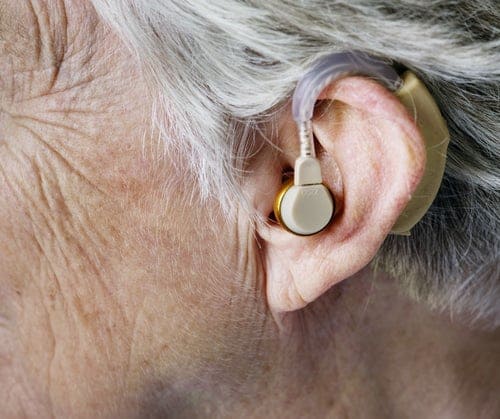
9. You’ve Become Less Outgoing
If you’re eliminating your favourite activities on your social calendar for no discernable reason, you might want to get to the source of the issue. Becoming less outgoing is often a sign that you aren’t aging well, especially if you’re avoiding opportunities for human interactions. You might want to consider undergoing testing for depression or another underlying health problem.
10. You’re Developing Less Muscle Mass
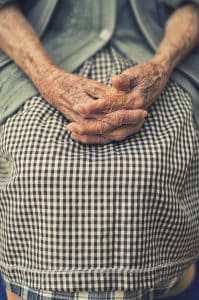
Your muscle strength is strongly correlated with how quickly you age, and losing muscle mass can contribute to poor posture, making you look and act older than you are. Rather than letting time win against your body, you can work to improve your fitness by stretching and performing other exercises that help you retain your strength and fitness level.
11. Your Sense of Smell is Diminished
Do you find your nose isn’t as sensitive as it once was? This can be a sign of Parkinson’s disease, a degenerative nerve condition that affects how your brain communicates with your muscles. Lack of smell is also an indicator of Alzheimer’s, a health condition that can make you appear significantly older than you are. To see whether you’re at risk, consider taking the Alzheimer’s smell test at DoctorOz.com.
12. You Have Chronic Red Eyes
Are your eyes looking bloodshot no matter how much sleep you get? This discoloration could be a sign that you’re suffering from the early stages of arthritis. This condition causes inflammation throughout your joints, and it can also be seen in your eyes. While arthritis is a chronic condition, you can best manage the symptoms if you address them as early as possible by visiting an expert.
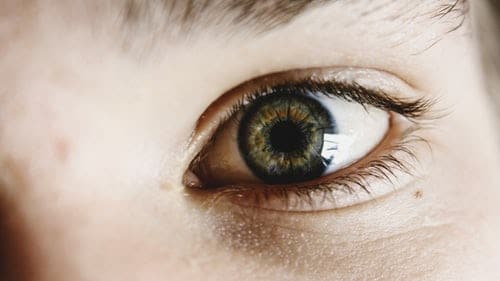
Address the Causes of Aging at The Dempster Clinic- Center for Functional Medicine
You might not be able to stop the signs of aging altogether, but there’s a lot you can do to ensure you continue to look and feel as healthy as possible. At The Dempster Clinic- Center for Functional Medicine, I can work with you to develop a wellness routine that keeps your systems working like they should to combat any indication of premature aging.
I am pleased to offer a Complimentary 15-minute Discovery Session for all potential patients. This session can take place over the phone or at the clinic in person. It provides an opportunity for you to learn more about the services I offer and how they can be of benefit to you.
Please schedule an appointment today! Your best health awaits.
Dr. John Dempster, ND
The Dempster Clinic- Center for Functional Medicine


